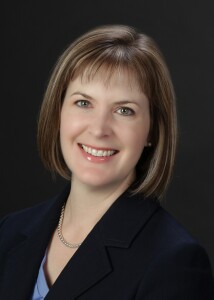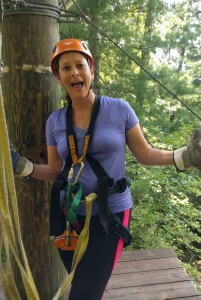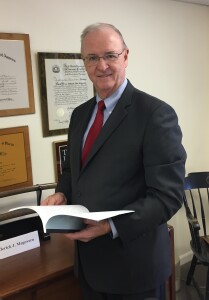Focus on an AAAA Fellow
|
Heather Strickland Arizona |
Sherry Neal Georgia |
Fred Magovern New York |
 |
 |
 |
| General Information: | General Information: | General Information: |
| 1. Practice Affiliation: MyersStrickland, PLLC 2. Year Admitted to the Bar: 2005 3. Prior Occupation: Software Marketing 4. Law School: University of Arizona James E. Rogers College of Law |
1. Practice Affiliation: Neal & Wright LLC 2. Year Admitted to the Bar: 1999 3. Prior Occupation: student 4. Law School: University of Georgia School of Law |
1. Practice Affiliation: Magovern & Sclafani – Family Law 2. Year Admitted to the Bar: 1972 3. Prior Occupation: No prior occupation unless you count being a maintenance man at Mercy Hospital during summers while in law school. 4. Law School: Fordham University School of Law 1971 Manhattan College 1968 |
| Your Law Practice: | Your Law Practice: | Your Law Practice: |
|
1. What led you to a legal career? I started out planning to complete a dual degree program of JD/MBA. I loved law school so much, I decided to skip the MBA. 2. Did you set out to practice adoption law and/or ART law or was it a natural progression? In 2007 I had the privilege of representing a courageous and loving young women who wanted to place her child for adoption. It was incredibly rewarding to walk with her in that journey. In the process I met Scott E. Myers, a respected adoption attorney, who identified me as his retirement plan! 3. Is there a particular aspect of the law you enjoy most? Least? I enjoy problem solving and the creativity I get to employ in adoptions and assisted reproduction law. 4. What is your greatest accomplishment as a lawyer? The empowerment of women who find themselves in a tough spot, and treating them with the dignity and respect they deserve. 5. What is the greatest lesson you have learned from practicing law? To have patience – because things will work out the way they are supposed to. 6. If you were starting over and choosing a career today, what would it be? I would choose to do exactly the same thing. I really love my work. |
1. What led you to a legal career? Deciding not to go to medical school and needing something to do after graduation… 2. Did you set out to practice adoption law and/or ART law or was it a natural progression? I went into law school thinking about environmental law since I was a biology major. I loved tax classes and seminars on children in the legal system and education law, but I was initially a litigator. I began doing adoptions pro bono under the supervision of ///A Fellow Rick Horder, who was a partner at the firm where I started. I loved it far more than my paid work. 3. Is there a particular aspect of the law you enjoy most? Least? I do enjoy cases with unique legal issues (like how to get a Georgia court to enter a termination order outside the context of an adoption action when there isn’t any statutory law directly on point). I do not like (or handle) contested cases. I hate conflict. 4. What is your greatest accomplishment as a lawyer? Founding the Georgia Council of Adoption Lawyers 5. What is the greatest lesson you have learned from practicing law? Look for good opportunities in bad situations. 6. If you were starting over and choosing a career today, what would it be? Elementary school media specialist (a/k/a librarian) |
1. What led you to a legal career? A family friend introduced me to Professor Joseph McLaughlin who was teaching at Fordham Law School and needed jurors for a moot court he was running. I rounded up my buddies at Manhattan College who were in the St. Thomas Moore Law Society to serve as jurors. It turned out to be an interesting experience. Professor McLaughlin inspired me to apply to law school. He was brilliant, funny, loved the law, and loved Fordham Law School. He later became Dean and subsequently served as a federal judge on the District Court and 2nd Circuit Court of Appeals. 2. Why adoption law? I had not a clue when I graduated from law school about adoption law. My first job was with a fellow who represented the New York Foundling Hospital. Big changes were occurring in foster care and adoption law in New York in the early 1970s. We ended up representing a number of child care agencies with me doing a lot of litigation in Family Court terminating parental rights and freeing children in foster care for adoption. I started my own law firm in 1979 in lower Manhattan and continued to represent child care agencies and adoptive parents in contested adoption proceedings both at trial and on appeal. I was fortunate to prevail in several significant adoption cases that changed adoption law in New York. 3. Enjoy most? I enjoy handling appeals and oral argument of the appeal. Enjoy least? Fear of losing a trial or appeal. 4. Greatest accomplishment as lawyer? Effecting positive changes in New York’s law to promote stability in adoptions through cases that I have handled from trial through appeal. 5. Greatest lesson learned? You win some cases you should’ve lost and lose some cases you should have won. I never want to lose a case for lack of effort. 6. Another career? Medicine? I come from a long line of physicians. |
| What Makes You "Tick": | What Makes You "Tick": | What Makes You "Tick": |
| 1. What would anyone be surprised to learn about you? That for the last 17 years, I have been the wife of an active duty U.S. Air Force officer. My husband and I have managed to advance two very different careers (my legal career and his navigator turned dentist career) while managing multiple moves, deployments, graduate schools and two rambunctious boys! 2. What was the very first job you ever had? Camp counselor at a children’s summer arts camp. 3. What is your greatest personal accomplishment (if different from your professional one)? See Number 1 4. Describe one of your most cherished memories. The afternoon in my kitchen when my mother told me that she thought my work as an adoption attorney was “really cool.” She passed away a week later. 5. What contributions do you make to help others? The empowerment of women who find themselves in a tough spot, and treating them with the dignity and respect they deserve. 6. What inspires you to go beyond your legal career to help others? The women I serve and the families they choose to raise their children. 7. What would you like your gravestone to say about you? No gravestone – please cremate me and sprinkle me in Kealakekua Bay on the Big Island of Hawaii. |
1. What would anyone be surprised to learn about you? Most people think I’m an extrovert when they meet me. I’m not. 2. What was the very first job you ever had? Either babysitting or filing for my Daddy’s tractor business. I don’t remember which came first. 3. What is your greatest personal accomplishment (if different from your professional one)? I’m still pretty proud of winning the essay competition at our state literary meet my senior year in high school. It was personally meaningful. 4. Describe one of your most cherished memories. Introducing my daughter to her new baby brother is up there at the top. 5. What contributions do you make to help others? Our family tries to engage in regular service and volunteer projects as well as to contribute financially to causes that are meaningful for us. I volunteer at my children’s school one day a week, hand-deliver neighborhood newsletters, serve on a couple of non-profit boards, and also manage a community service/action page on Facebook, the Love Trumps Hate – Do Good Project, that encourages grass-roots community service. 6. What inspires you to go beyond your legal career to help others? Really just the sense of doing something good and doing it well. 7. What would you like your gravestone to say about you? I don’t really want a gravestone. I’ll leave that to my kids to decide, if it’s meaningful to them. (My husband hates it, but I really want my remains to go to the Body Farm at the University of Tennessee’s Anthropological Research Center. I’m practical. I like to be useful. I care more about that than a headstone.) |
1. What would anyone be surprised to learn about you? I surf year round and I love going to the Metropolitan Opera. 2. What was the very first job you ever had? One summer while in high school, I thought I could make money clamming in the Great South Bay on Long Island. I engaged a couple of friends to work with me. We mostly drank beer and had seaweed fights when not cutting our feet feeling for the clams. At the end of a blistering day one, the money we made selling the few clams that we ‘harvested’ was far less than what we spent on gas for the boat and for the beer. End of that business. 3. Greatest personal accomplishment? Convincing my wife to stay married to me for forty-three years. Seriously? A happy marriage to a wonderful wife and our two great sons and happy clients. 4. Describe one of your most cherished memories. Professionally - Learning that I passed the New York State Bar two days after being told by a relative with supposedly advanced information that I had failed to pass the bar exam. I had already informed my employer that I had failed the bar exam. Not a pleasant two days. Personally - Becoming a parent. 5. What contributions do you make to help others? I provide adoption advice to just about anyone who calls me asking for help. I routinely reduce my legal charges and/or continue to provide legal service and representation to those in need who cannot pay my legal fees. 6. Inspiration for helping others? Jesuit tradition of being "Men for others.” I have been helped by many other people along my career path. One trial attorney in particular, Louis J. Martine, Esq., was most inspirational. He gave me a desk in his office when I was starting my own legal practice in 1979, didn’t want me to pay him anything, told me that I would be successful if I worked hard, freely gave me legal advice and tutorials on trial tactics, and showed me the importance of loyalty to your family, your friends, your God and Country through his words and deeds. 7. Gravestone? “He was a good husband, good father, and a good lawyer.” . |
